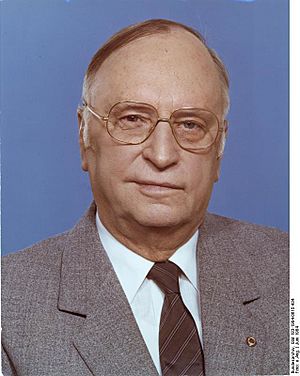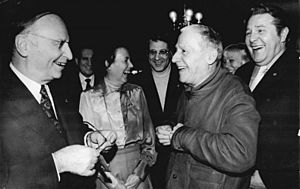Kurt Hager facts for kids
Quick facts for kids
Kurt Hager
|
|
|---|---|

Hager in 1984
|
|
| Secretary for Science, Culture and Education of the Socialist Unity Party | |
| In office 15 April 1955 – 10 November 1989 |
|
| General Secretary | |
| Preceded by | Position established |
| Succeeded by | Position abolished |
| Member of the Volkskammer for Jena-Stadt, Jena-Land, Rudolstadt, Saalfeld |
|
| In office 16 November 1958 – 16 November 1989 |
|
| Preceded by | multi-member district |
| Succeeded by | Constituency abolished |
| Personal details | |
| Born |
Leonard Kurt Hager
24 July 1912 Bietigheim, Kingdom of Württemberg, German Empire (now Bietigheim-Bissingen, Baden-Württemberg, Germany) |
| Died | 18 September 1998 (aged 86) Berlin, Germany |
| Resting place | Zentralfriedhof Friedrichsfelde |
| Political party | German Communist Party (1995–1998) |
| Other political affiliations |
Party of Democratic Socialism (1989–1990) Socialist Unity Party (1946–1989) Communist Party of Germany (1930–1946) |
| Spouse | Sabina Schauer |
| Children | 2 |
| Alma mater | Parteihochschule Karl Marx |
| Occupation |
|
| Awards |
|
|
Central institution membership
1963–1989: Full member, Politburo of the Central Committee
1959–1963: Candidate member, Politburo of the Central Committee 1954–1989: Full member, Central Committee 1950–1966: Candidate member, Central Committee Other offices held
1979–1989: Member, National Defence Council
1976–1989: Member, State Council 1952–1955: Head, Department for Science of the Central Committee Secretariat 1949–1952: Head, Department for Propaganda of the Central Committee Secretariat |
|
Kurt Hager (born July 24, 1912 – died September 18, 1998) was an important politician in East Germany. He was a leading member of the Socialist Unity Party of Germany, which was the main political party in East Germany. Hager was known as the party's chief thinker and played a big role in shaping cultural and educational policies in the country.
Contents
Kurt Hager: A Key Figure in East Germany
Early Life and Activism
Kurt Hager was born in Bietigheim, a town in Germany, on July 24, 1912. His father was a worker and his mother was a cleaner. He finished high school in 1931.
As a young man, he was part of the YMCA and a Socialist Student Union. He worked as a journalist. In 1930, he joined the Communist Party.
In 1933, he was arrested and sent to a detention camp called Lager Heuberg. After a short time, he left Germany in 1936.
Life in Exile
From 1936 to 1937, Hager worked as a messenger for the Young Communist League of Germany. He traveled through Switzerland, France, and Czechoslovakia.
From 1937 to 1939, he was a journalist during the Spanish Civil War. He worked for German and Spanish radio stations.
In 1939, he was held in France before moving to England. There, he helped with the international work of the Communist Party. When World War II started, he was held in internment camps in England, first near Liverpool and then on the Isle of Man.
His Role in East Germany

In 1945, Hager returned to Berlin. For a short time, he worked as a forestry worker and welder. Later, he became a journalist for a magazine called "Freie Tribüne."
He became the deputy chief editor of "Vorwarts," a newspaper. In 1948, he completed his studies at the Parteihochschule Karl Marx, which allowed him to become a university lecturer. By 1949, he was a full professor of philosophy at the Humboldt University of Berlin.
Political Career in the SED
In 1946, Hager joined the SED. This party was very powerful in East Germany. He quickly moved up in the party.
He became head of the party's Training Division and then the Propaganda Department. From 1952, he led the Science Division. In 1954, he became a member of the SED's Central Committee.
In 1955, he became a secretary responsible for science, education, and culture. From 1963, he was a full member of the Politburo, which was the highest decision-making body of the SED.
Hager also served in the Volkskammer (East Germany's parliament) from 1958. He was a member of the State Council of East Germany and the National Defense Council. He was seen as the main person in charge of culture and ideas within the SED Politburo.
Views and Later Years
Kurt Hager believed that East German culture and history were separate from West Germany's. In 1987, he gave a famous interview about the changes happening in the Soviet Union under Mikhail Gorbachev.
When asked if East Germany should also make similar changes, Hager replied, "Would you, if your neighbor repapers his apartment, feel like you should also repaper your apartment?" This showed that he did not support the new policies of openness (glasnost) and reform (perestroika) from the Soviet Union. Many people in East Germany were unhappy with this view.
In November 1989, as East Germany was changing, Hager was removed from his positions. In 1990, he was expelled from the SED-PDS party.
Hager received many awards during his career. These included the Banner of Labor, the Patriotic Order of Merit, and the title of Hero of Labour. He also received the Order of Karl Marx multiple times.
His daughter, Nina Hager, also became involved in politics. She is a leader in the German Communist Party (DKP).
Kurt Hager passed away in Berlin in 1998. He is buried in the Zentralfriedhof Friedrichsfelde cemetery.
 | Leon Lynch |
 | Milton P. Webster |
 | Ferdinand Smith |

